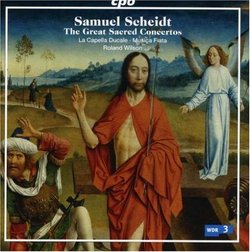Up to standard
scott | Calgary, Canada | 05/19/2008
(4 out of 5 stars)
"Samuel Scheidt is relatively well known, at least by his instrumental and organ works, but his vocal music is quite hard to come by. There is a long-deleted recording on EMI of Christmas motets with the London Cornett and Sackbutt Ensemble under Theresa Caudle, and some Oxbridge choir (I forget which), but aside from that, Scheidt's church music is basically unrecorded. When I heard about this recording by Wilson, I was very keen to buy it, as it would nicely fill a gap in my Scheidt collection.
Most of the pieces here are multi-choir motets, some of which are based on smaller scale versions for the lean times of the Thirty Years war. The music itself is very good, although not stunning or very innovative.
Scheidt was very much rooted in the Germanic Lutheran tradition of Praetorius and Schutz, and the music follows many of the conventions so familiar in the music of that time and place.
Roland Wilson has his usual forces, and they do their usual excellent job. The instruments of Musica Fiata are always very tight and secure, and never let down the performance. The vocalists of La Capella Ducale are also super. I must admit the sometimes in other recordings (Pachelbel motets specifically) I find Ralf Popken a bit harsh sounding, but here he does not distract at all. The two sopranos are excellent, and blend so well that I can't distinguish between them. The only reason I don't give this five stars, it that somehow there is nothing really special that makes this a recording to treasure. The music is very good, as is the performance, but it lacks a certain fizz or sparkle that this repetoire can possess. Overall, though, I welcome this release, and hope that further explorations into Scheidt's vocal music follow."
More Scheidt
Giordano Bruno | Wherever I am, I am. | 02/13/2009
(5 out of 5 stars)
"As I suggested in a previous review, if you're sated with the Three B's, you might want to become familiar with the Three SCH's of 17th Century German music: Heinrich Schütz, Johann Hermann Schein, and Samuel Scheidt. Schütz's reputation is secure and there are numerous superb recordings of his music; nearly his complete oeuvre is available. That's not the case with Schein or Scheidt. A few solid performances of Schein's finest work, "Israelis Brünnlein", have appeared on CDs. Scheidt's most ambitious compositions for voices and instruments are represented by just two worthy CDs, "Concertuum Sacrorum" performed by La Fenice/Ricercar Consort, and this disk, "The Great Sacred Concertos" performed by Musica Fiata/Capella Ducale. The Ricercar performance is easily the more exciting of the two; I've already reviewed it.
Scheidt was the ultimate home-boy in an era of musical cosmopolitanism. Born in the city Halle, near Leipzig, Scheidt spent only two years elsewhere, studying in Amsterdam with Jan Sweelink. His entire career was spent back in Halle in the service of the Margrave. Unfortunately, Halle was a strategic prize in the Thirty Years War, changing occupations several times, and the second half of Scheidt's musical history is a tale of depleted musical resources. The effects can be heard on the two CDs under discussion. Ricercar's selection of Scheidt compositions comes from his publications of 1620/22, while Musica Fiata's are taken from volumes published between 1631 and 1640, consisting mainly of small-scale works for two or three voices with continuo.
What is it that makes this CD less exciting? The same superb soprano, Monika Mauch, sings on both CDs. Roland Wilson is not as brilliant a cornettist as Jean Tubery but his playing on the disk is quite excellent. He is the director of the two ensembles, Musica Fiata and Capella Ducale, and his reconstructions of Scheidt's small-scale sacred concertos are what you hear here. He has chosen to perform Scheidt very conservatively, in the polychoral tradition of Venice and Gabrieli, with little of the 'stile concertato' operatic affect of the Italian Baroque. There's too much simple instrumental doubling of voices for my taste. The result sounds more like Praetorius than like Schütz or Rosenmüller, the great 'progressive' composers of the era. Honestly, Wilson's reconstructions and ensemble decisions may be historically justified, in which case I'd have to agree with the previous reviewer that there's "nothing special" here. But then, that other CD, Tubery's, says otherwise.
This is a more-than-competent performance, nevertheless, and a CD worth hearing many times. As I said, the cornetto playing is first-class, as are all the other instruments except a brief, lamentable flurry of notes from a sopranino recorder on track 6. The vocal ensemble is tightly blended and resonant. The two basses, Harry van der Kamp and Wolf Matthias Friedrich, are eloquent and tuneful, and their timbres blend well with the prominent roles assigned to the trombones. In fact, you'll seldom hear better polychoral ensemble than this, and that's why I've given the CD a full five-star rating, even though the repertoire is less impressive than I might expect from one of the Three SCH's."

